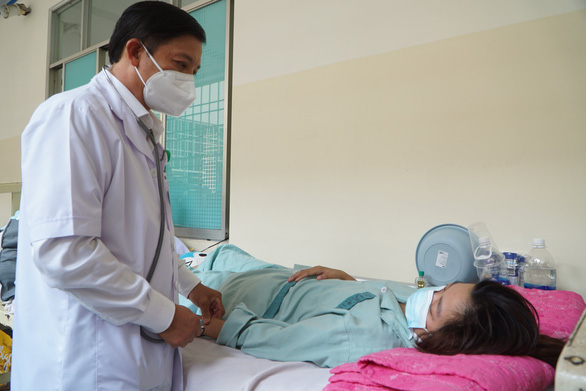 Society
Society


|
| A patient with dengue fever receives treatment at the Hospital for Tropical Diseases. — Photo tuoitre.vn |
HCM CITY — HCM City prepares three scenarios to respond to the dengue epidemic, ensuring an efficient treatment system for 2,000 to 6,000 patients.
HCM City Department of Health has issued a plan to ensure hospital admission of patients for the treatment of dengue fever in the city.
In an effort to be prepared, officials are planning to respond to scenarios from 2,000 to 6,000 cases of dengue fever.
Scenario 1 envisions fewer than 300 new hospital admissions per day, fewer than 2,000 inpatients and fewer than 200 severe cases in hospitals. The total bed size reserved for dengue treatment in such a scenario is 2,405 beds and the number of positive recovery beds is 260.
The beds will be available across 14 hospitals, including Chợ Rẫy Hospital, Thống Nhất Hospital, HCM City University of Medicine and Pharmacy Hospital and 175 Military Hospital, among others.
Priority should be given to treating severe cases at ministerial hospitals, the Hospital for Tropical Diseases, Trưng Vuơng Hospital and general hospitals of HCM City. Meanwhile, children will be sent to a specialised pediatric hospital.
The city will need 300 doctors and 600 nurses to take care of dengue patients, 160 specialists in resuscitation and 320 nurses to take care of the seriously ill.
Scenario 2 envisions 300 to 600 new hospital admissions per day, 2,000 to 4,000 inpatients and 200 - 400 severe cases in hospitals. The total number of beds for dengue treatment in this scenario is 4,000 beds and for intensive resuscitation would require 410 beds across 14 hospitals.
It is crucial to expand the size of hospital beds for dengue treatment and intensive care beds in public hospitals in the second scenario.
This situation requires 550 doctors and 1,100 nursing staff, 320 critical care specialists, and 640 nurses for the critically ill.
Scenario 3 envisions 600 to 900 new admissions per day, 4,000 to 6,000 inpatients and 400 to 600 severe cases in hospitals. The total number of beds in this scenario is 6,000 beds, along with 605 beds reserved for positive recovery.
About 800 doctors and 1,600 nurses would be prepared to care for the sick, along with 480 specialists and 960 nurses to care for the critically ill.
According to recent reports from some hospitals, it is estimated that on average, a case of severe dengue fever will use six litres of infusion fluid and two units of blood and blood products.
Therefore, based on specific situations, it is necessary to plan for enough transfusion fluids, blood and blood products for one month.
The Department of Health requires hospitals to be ready to receive and treat dengue fever patients according to their division while reviewing and adjusting the procedures for the smooth receiving and screening for each dengue case.
Hospitals are required to strengthen monitoring of dengue patients who are inpatients during holidays and weekends to detect and promptly treat cases with worsening symptoms.
Hotlines will be set up, along with preparations for quality facilities, equipment and blood transfusions, among others. — VNS




